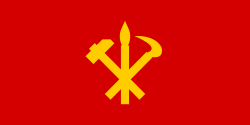4th Congress of the Workers' Party of Korea

The flag of the Workers' Party of Korea
|
|
| Date | 11–18 September 1961 (7 days) |
|---|---|
| Location | Pyongyang, North Korea |
| Participants | 1,657 voting and 73 non-voting delegates |
| Outcome | Election of the 4th Central Committee and 4th Central Inspection Commission |
The 4th Congress of the Workers' Party of Korea (WPK), referred to by Kim Il-sung as the "Congress of Victors", was held in Pyongyang, North Korea, from 11–18 September 1961. The congress is the highest organ of the party, and is stipulated to be held every four years. 1,657 voting and 73 non-voting delegates represented the party's 1,311,563 members. The 4th Central Committee, elected by the congress, reelected Kim Il-sung as WPK Chairman, and a number of deputy chairmen.
1,657 voting and 73 non-voting delegates were elected to represent the party's 1,311,563 members. 32 different fraternal parties sent delegations to the 4th Congress, among these were the Communist Party of the Soviet Union (led by Frol Kozlov), the Communist Party of China (led by Deng Xiaoping), the Socialist Unity Party (led by Alfred Krehler) and the Japanese Communist Party (led by Kenji Miyamoto) among others.
Kim Il-sung delivered a six-hour-long report on the work of the 3rd Central Committee since the 3rd Congress (held in 1956). In his report, Kim Il-sung talked about the economic accomplishments made since the 3rd Congress, the First Seven-Year Plan, Korean reunification, the party's victory over the factionalist tendencies and the international position of the WPK. A notable success of the 3rd Central Committee was the collectivization of agriculture and the nationalization of all industries had been completed, together with the fact that 52 percent of the North Korean workforce were by definition industrial workers (accomplishing the party's task of creating a proletariat). Kim Il-sung asserted that these developments had been initiated by the Chollima Movement, a Stakhanovite movement inspired mobilization campaign, in which more than 2 million workers were participating in. He then concluded his section by claiming that exploitation was non-existent in North Korea. He then went on too talk about the First Seven-Year Plan, stating it would be a continuation of the previous successful five-year plan, and that the state would continue to prioritise heavy industry while simultaneously develop light industry and agriculture. In regards to South Korea, Kim Il-sung trivialized the April Revolution which led to the overthrow of Syngman Rhee, the President of South Korea, believing it mattered little in the long run since North Korea was both stronger and more prosperous then South Korea. He then began speaking about the party's victory over the factionalists, citing that the party had grown rapidly in the last years and needed to appoint younger men to the top through the party's youth league, the League of Socialist Working Youth (LSWY). He then ended his speech by talking about the WPK's international position, stating that North Korea emphasized the importance of good relations between fraternal socialist countries (telling the Chinese and Soviet delegations that North Korea would remain neutral in the Sino–Soviet dispute).
...
Wikipedia
